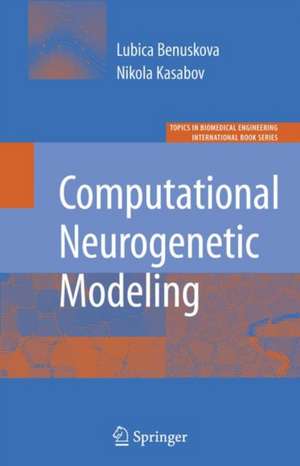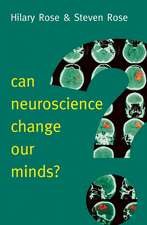Computational Neurogenetic Modeling: Topics in Biomedical Engineering. International Book Series
Autor Lubica Benuskova, Nikola K. Kasaboven Limba Engleză Hardback – 3 mai 2007
| Toate formatele și edițiile | Preț | Express |
|---|---|---|
| Paperback (1) | 982.65 lei 38-44 zile | |
| Springer Us – 19 noi 2010 | 982.65 lei 38-44 zile | |
| Hardback (1) | 1100.30 lei 6-8 săpt. | |
| Springer Us – 3 mai 2007 | 1100.30 lei 6-8 săpt. |
Preț: 1100.30 lei
Preț vechi: 1158.20 lei
-5% Nou
Puncte Express: 1650
Preț estimativ în valută:
210.55€ • 220.27$ • 174.90£
210.55€ • 220.27$ • 174.90£
Carte tipărită la comandă
Livrare economică 02-16 aprilie
Preluare comenzi: 021 569.72.76
Specificații
ISBN-13: 9780387483535
ISBN-10: 0387483535
Pagini: 290
Ilustrații: XII, 290 p.
Dimensiuni: 155 x 235 x 20 mm
Greutate: 0.57 kg
Ediția:2007
Editura: Springer Us
Colecția Springer
Seria Topics in Biomedical Engineering. International Book Series
Locul publicării:New York, NY, United States
ISBN-10: 0387483535
Pagini: 290
Ilustrații: XII, 290 p.
Dimensiuni: 155 x 235 x 20 mm
Greutate: 0.57 kg
Ediția:2007
Editura: Springer Us
Colecția Springer
Seria Topics in Biomedical Engineering. International Book Series
Locul publicării:New York, NY, United States
Public țintă
ResearchCuprins
Computational Neurogenetic Modeling (CNGM): A Brief Introduction.- Organization and Functions of the Brain.- Neuro-Information Processing in the Brain.- Artificial Neural Networks (ANN).- Evolving Connectionist Systems (ECOS).- Evolutionary Computation for Model and Feature Optimization.- Gene/Protein Interactions — Modeling Gene Regulatory Networks (GRN).- CNGM as Integration of GPRN, ANN and Evolving Processes.- Application of CNGM to Learning and Memory.- Applications of CNGM and Future Development.
Textul de pe ultima copertă
Computational Neurogenetic Modeling Integrating Bioinformatics and Neuroscience Data, Information and Knowledge via Computational Intelligence
Lubica Benuskova and Nikola Kasabov
With the presence of a great amount of both brain and gene data related to brain functions and diseases, it is required that sophisticated computational neurogenetic models be created to facilitate new discoveries that will help researchers in understanding the brain in its complex interaction between genetic and neuronal processes. Initial steps in this direction are underway, using the methods of computational intelligence to integrate knowledge, data and information from genetics, bioinfomatics and neuroscience.
Computational Neurogenetic Modeling offers the knowledge base for creating such models covering the areas of neuroscience, genetics, bioinformatics and computational intelligence. This multidisciplinary background is then integrated into a generic computational neurogenetic modeling methodology. computational neurogenetic models offer vital applications for learning and memory, brain aging and Alzheimer’s disease, Parkinson’s disease, mental retardation, schizophrenia and epilepsy.
Key Topics Include:
About the Authors:
Lubica Benuskova is currently Senior Research Fellow at the Knowledge Engineering & Discovery Research Institute (KEDRI, www.kedri.info), Auckland University of Technology (AUT) in Auckland, New Zealand. She is also Associate Professor of Applied Informatics at the Faculty of Mathematics, Physics and Informatics at Comenius (Komensky) University in Bratislava, Slovakia. Her research interests are in the areas of computational neuroscience, cognitive science, neuroinformatics, computer and information sciences.
Nikola Kasabov is the Founding Director and Chief Scientist of KEDRI, and a Professor and Chair of Knowledge Engineering at the School of Computer and Information Sciences at AUT. He is a leading expert in computational intelligence and knowledge engineering and has published more than 400 papers, books and patents in the areas of neural and hybrid intelligent systems, bioinformatics and neuroinformatics, speech-, image and multimodal information processing. He is a Fellow of the Royal Society of New Zealand, Senior Member of IEEE, Vice President of the International Neural Network Society and a Past President of the Asia-Pacific Neural Network Assembly.
Lubica Benuskova and Nikola Kasabov
With the presence of a great amount of both brain and gene data related to brain functions and diseases, it is required that sophisticated computational neurogenetic models be created to facilitate new discoveries that will help researchers in understanding the brain in its complex interaction between genetic and neuronal processes. Initial steps in this direction are underway, using the methods of computational intelligence to integrate knowledge, data and information from genetics, bioinfomatics and neuroscience.
Computational Neurogenetic Modeling offers the knowledge base for creating such models covering the areas of neuroscience, genetics, bioinformatics and computational intelligence. This multidisciplinary background is then integrated into a generic computational neurogenetic modeling methodology. computational neurogenetic models offer vital applications for learning and memory, brain aging and Alzheimer’s disease, Parkinson’s disease, mental retardation, schizophrenia and epilepsy.
Key Topics Include:
- Brain Information Processing
- Methods of Computational Intelligence, Including:
- Artificial Neural Networks
- Evolutionary Computation
- Evolving ConnectionistSystems
- Gene Information Processing
- Methodologies for Building Computational Neurogenetic Models
- Applications of CNGM for modeling brain functions and diseases
About the Authors:
Lubica Benuskova is currently Senior Research Fellow at the Knowledge Engineering & Discovery Research Institute (KEDRI, www.kedri.info), Auckland University of Technology (AUT) in Auckland, New Zealand. She is also Associate Professor of Applied Informatics at the Faculty of Mathematics, Physics and Informatics at Comenius (Komensky) University in Bratislava, Slovakia. Her research interests are in the areas of computational neuroscience, cognitive science, neuroinformatics, computer and information sciences.
Nikola Kasabov is the Founding Director and Chief Scientist of KEDRI, and a Professor and Chair of Knowledge Engineering at the School of Computer and Information Sciences at AUT. He is a leading expert in computational intelligence and knowledge engineering and has published more than 400 papers, books and patents in the areas of neural and hybrid intelligent systems, bioinformatics and neuroinformatics, speech-, image and multimodal information processing. He is a Fellow of the Royal Society of New Zealand, Senior Member of IEEE, Vice President of the International Neural Network Society and a Past President of the Asia-Pacific Neural Network Assembly.
Caracteristici
Includes a foreword by series editor Bin He, an IEEE Fellow and the IEEE's Engineering in Medicine and Biology Society's 2004 Neural Engineering Chair



















